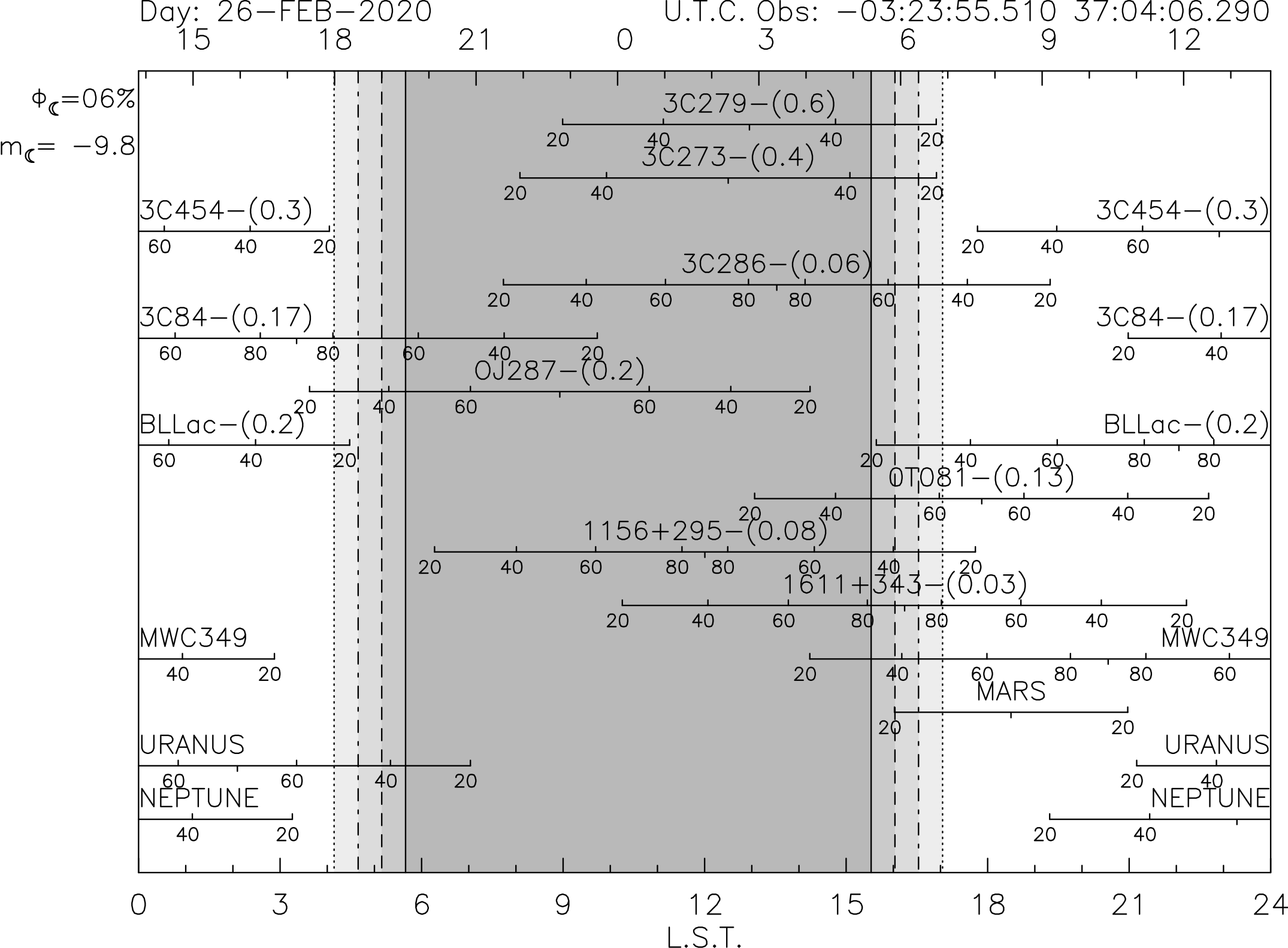|
Size: 3233
Comment:
|
Size: 3233
Comment:
|
| Deletions are marked like this. | Additions are marked like this. |
| Line 39: | Line 39: |
| [[B2251+158|https://www.physics.purdue.edu/astro/MOJAVE/sourcepages/2251+158.shtml]] had 6% polarization in December 2019 (I 5Jy) = This is 3C 454.3 | [[https://www.physics.purdue.edu/astro/MOJAVE/sourcepages/2251+158.shtml|B2251+158]] had 6% polarization in December 2019 (I 5Jy) = This is 3C 454.3 |
Leakage:
At that time of the year, Mars is at low elevation in the morning and Uranus transiting At high elevations in the afternoon: as discussed yesterday this is not optimal to get the best focused observations we need to produce leakage maps at different elevations, but using Mars at low elevations in the morning mitigates this issue. We need at least 3 independent points in each elevation bin to make sure we have a consistent pattern repeating at a given elevation, and use this leakage to correct our data. We suspect we will have to do this as late in the afternoon as possible to have very stable atmosphere, when the source sets from 70 deg down to 20 deg. So these observations will required at least 3 days of excellent weather.
Polarization Angles:
We need simultaneous (same day) observations with XPOL and NIKA2 of strongly polarized sources (not too much affected by leakage variation with El). And the XPOL observations need to be deep enough to achieve high SNR detections at 1mm for comparison with NIKA2-Pol measurements. This will require a couple of days to be carried out in a set of 3-5 quasars with strong polarization (for example 3C286 transiting in the night).
Science verification on extended emission:
We will go for Crab, OMC1 (transiting at sunset), DR21 (transiting in the morning) to check the results against the data obtained in December 2018 and hence validate the repeatability of NIKA2-Pol. Ideally, we also need to observe fainter/less extended sources such as IRAS4A and B335 whose polarization has also been extensively studied and can be compared to existing data in the literature. Altogether these observations will also require 1.5 days.
Visibilities of sources: 
Notes on QSO status (Feb 19)
POLAMI observations from Feb 17 are being analyzed by Ioannis: do not expect other strongly polarized QSOs than the usual 3C273, 3C279 and 3C454.3 From already available measurements:
B2251+158 had 6% polarization in December 2019 (I 5Jy) = This is 3C 454.3
Other high pol / interesting sources:
https://www.physics.purdue.edu/astro/MOJAVE/sourcepages/0219+428.shtml had 14% polarization in December 2019 (but I 0.27Jy) = This is 3C66 A
https://www.physics.purdue.edu/astro/MOJAVE/sourcepages/1156+295.shtml had 25% polarization in January 2020 (but I 0.3Jy)
https://www.physics.purdue.edu/astro/MOJAVE/sourcepages/0235+164.shtml had 5% polarization in December 2019 (but I 0.8Jy)
https://www.physics.purdue.edu/astro/MOJAVE/sourcepages/1611+343.shtml had 5% polarization in December 2019 (but I 0.8Jy)
https://www.physics.purdue.edu/astro/MOJAVE/sourcepages/0316+413.shtml had 9% polarization in January 2020 (but I 0.5Jy)
ALMA obs at 1mm done in January (closed for altiplanic winter since Jan. 29) suggest the following QSOs had polarized flux >0.1 Jy: J1256-0547, J0522-3627, J2253+1608, J2158-1501, J0854+2006, J1229+0203, J0319+4130, J1924-2914, J1337-1257, J2258-2758, J0423-0120
